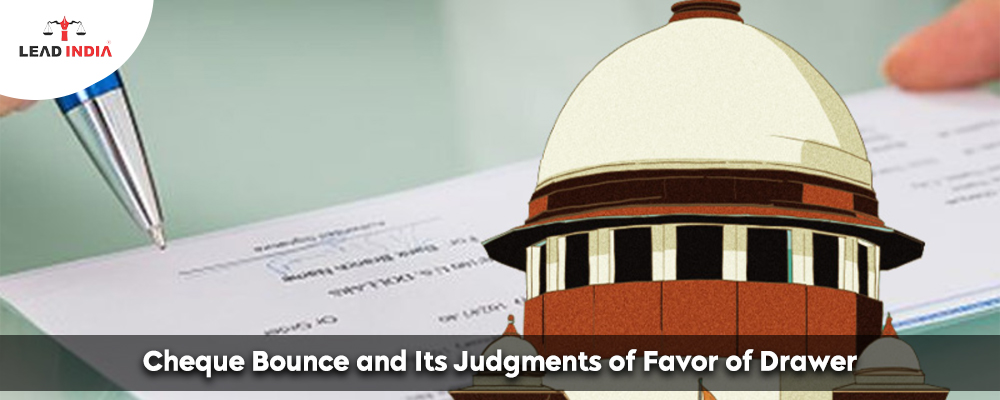Dishonouring a cheque is punishable by up to two years in jail under Section 138 if the cheque is endorsed for insufficient cash. Recent instances have shown time and time again that cases about the dishonoring of checks take a very long time to resolve. The legislation’s sanctity has been diminished as a result of the prolonged trials for crimes under Section 138.
Key Legal Provisions
- Cheque bounce is a crime that carries a one-year jail sentence or a fine under Section 138. The sentence might last up to two years.
- Section 142 contains the process for notifying authorities of an offense by Section 138. In contrast, Section 147 provides for the compoundability of Act crimes.
- The assumption that the drawee will be compensated for any obligation or liability of the drawer is established under Section 139. This debt discharge may be partial or complete.
- Notwithstanding anything in the Criminal Procedure Code, 1973 (CrPC), Section 143 deals with the trial of cases under Section 138, which is summary proceedings. The Negotiable Instruments (Amendment and Miscellaneous Provisions) Act of 2002 introduced a new section, 143. According to Section 143(3), the drawee shall make every endeavor to conclude the trial processes within six months of the date on which the complaint was filed.
- The drawer is not permitted to claim ignorance of the possibility that Section 140 of the Negotiable Instruments Act, it clarifies that the drawer of a dishonored cheque cannot defend themselves by claiming they had no reason to believe the cheque would bounce. This interpretation was affirmed in the case of Dashrath Rupsingh Rathod v. State of Maharashtra, (2014) 9 SCC 129.
Need A Legal Advice
The internet is not a lawyer and neither are you. Talk to a real lawyer about your legal issue

Crucial Elements of Cheque Bounce
- Cheque Drawing
- Bringing the cheque to the bank
- The bank should return or reject the cheque that is presented.
- The cheque drawer will receive a formal notice requesting payment of the cheque.
- Finally, after receiving such notification for 15 days, the drawer ought to have neglected to pay.
Cheque Bounce Judgments in Favour of Drawer
Krishna Janardhan Bhat V. Dattatraya G. Hedge
In this case, the appellant and R.G. Bhat were co-owners of a company in Hubli named Vinay Enterprises. The appellant gave the said attorney a power of attorney and gave him four blank checks for business expenses. One of those checks said 1,50,000 instead of 15,000 as it should have. Because he was abusing the power, the appellant revoked the power of attorney. The appellant sought the respondent on his own to return the loan money after the respondent lent Rs. 1,50,000 to him; however, the said cheque was returned dishonored when it was submitted. A notification concerning the dishonor of the cheque was issued to the appellant. After finding the appellant guilty, the trial court sentenced him to six months in prison and Rs. 1,50,000 in compensation. The court set aside the appellant’s conviction and established the requirements for bringing a case for dishonoring checks. The judgment was reversed and declared that the handwriting on the cheques was that of R.G. Bhat. The presumption of innocence was also accepted. First, the debt needs to be legally actionable; next, the cheque needs to be returned for lack of funds; and last, the cheque needs to be paid within the required time frame for validation.
The numerous factors that have added to the complexity of the proceedings have resulted in a massive backlog of cases under Section 138. The law about the same is regularly being improved. Reducing the quantity of cases, however, is currently the Courts’ largest problem.
As long-pending cases cannot be dismissed in the middle of their proceedings, the decriminalization of the offense may not work as planned at this time. The restoration of the debtor’s paradise would imply an imbalance in the balance between the protections afforded to creditors and debtors, which would only put further strain on the economy. A preferable strategy would be to encourage pre-litigation settlements and change the current Act simultaneously to reduce the workload on the courts.
Lead India provides free legal advice and online information among other legal services. We offer a platform where you can talk with a lawyer and ask legal questions. Lead India’s lawyers can help you with any legal matters. Lead India offers free online legal help in India. In addition to providing legal advice online, Lead India allows users to ask professionals questions for free.





 Talk to a Lawyer
Talk to a Lawyer